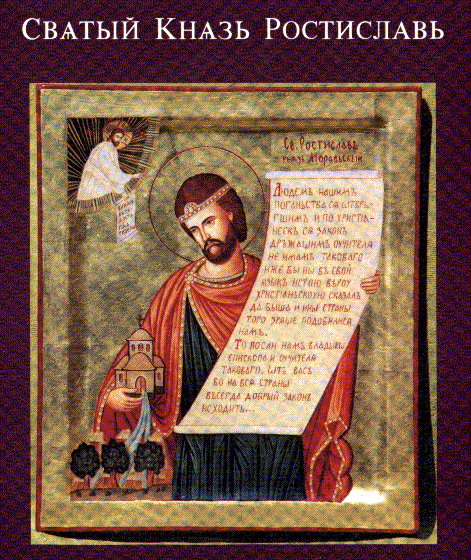Первая страница / Литургия / Вечерня и Утреня / Октоих / Праздники / Триодь Постная / Триодь Цветная / Различные ноты / Тексты
* * *

Whenever when we think about the Byzantine mission of St. Kyrillo and St. Methodius in Greater Moravia, we have to remember St. Duke Rostislav who stands together with them at the beginning of the spiritual, cultural and political life of the Slavonic nations, We have to remember the enlightened ruler who wanted «such a teacher who could explain Christian teaching in an understandable manner» to his nation. It was he who initiated bringing the learned «Philosopher» St. Kyrillo and the capable organizer St. Methodius to Greater Moravia from Emperor Michaelos III and the patriarch of Constantinople St. Photios.
St.Rostislav probably came to rule over Greater Moravia around 846 and soon realized that if Christianity was to be accepted by Moravians, it couldn’t be preached by missionaries who misused their mission for political aims or were not understood by the people. After an unsuccessful attempt to get suitable teachers from Rome, he asked for teachers from Constantinople in 862. The holy brothers who were sent by the Byzantine Emperor were learned men of prayer with rich experience and a full understanding of St. Rostislav’s aims. They invented the alphabet and translated the major part of the Bible and Byzantine liturgies into the Slavonic language. No wonder that their missionary work and the example of their holy lives met with great appreciation and support.
Nevertheless, their work was complicated by missionaries from the Frankish kingdom who realized that St. Kyrillos’ and St. Methodius’ work was fully supported by St. Duke Rostislav in laying down the foundations of Greater Moravian spiritual and political independence. They falsely accused the holy brothers of using an «unsanctified» Slavonic language and tried to spread false filioquist teaching. St. Methodios won his famous dispute with the Latin clergy in Venice in 867 on his way to Constantinople, where the holy brothers wanted to get appointments for their Greater Moravian pupils and also further support for their mission. From Venice they were invited to Rome by Pope Nicolas I. The holy brothers again had to defend their missionary work. St. Kyrillo died in Rome on 14th February 868 after takeing monastic vows but asked his brother St. Methodius to continue their mission among the Slavs.
But the Greater Moravian situation had changed in the meantime. Even though Rostislav had successfully defended his dominion against Frankish attacks, in 87O he was finally betrayed by Svatopluk, his duke in Nitra. Svatopluk imprisoned St. Rostislav and turned him over to the Franks. St. Rostislav was tried and tortured in Regensburg for his love of his nation, of Christ and his true apostolic teaching. He was condemned to death by the Franks, blinded and thrown into jail. He died at the end of 870 in an unknown place after suffering terribly. St. Methodius was imprisoned on his way back to Greater Moravia. He was judged and beaten by Frankish bishops, and Greater Moravia was conquered and plundered by the Franks. Svatupluk, who had previously imposed the Frankish interests on Moravia, betrayed Germans and renewed Greater Moravian independence. But the influence of Latin and Frankish interests imposed by the clergy on his court — and on him personally — remained strong. When the success of Svatopluk’s policy was realized in 873 the Pope remembered the imprisoned Methodius and interceded so that he could return to his flock and apostolic work which had been initiated by St. Rostislav.
St. Duke Rostislav worked with St. Kyrillo and suffered with St. Methodius. He died for his nation and for the true teaching of Christ. Later foreign influence demanded that his holy life and the apostolic work of the holy brothers had to be forgotten in Grater Moravia. St. Methodius’ pupils were expelled from the territory and sold into slavery after their teacher’s death, but God’s providence saved their lives for blessed apostolic work among the southern and eastern Slavonic nations. St. Rostislav’s efforts gave rise to fluorishing Slavonic churches and cultures among Bulgarians, Russians and Serbs. By officially canonizing St. Rostislav, The Orthodox Church in Czech lands and Slovakia pays its one thousand year debt to an enlightened ruler who initiated our true Christian spiritual culture and independence.




